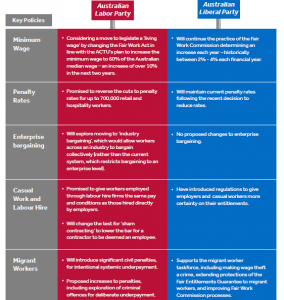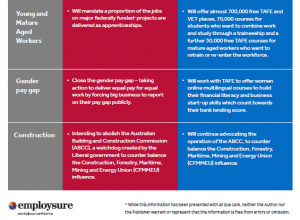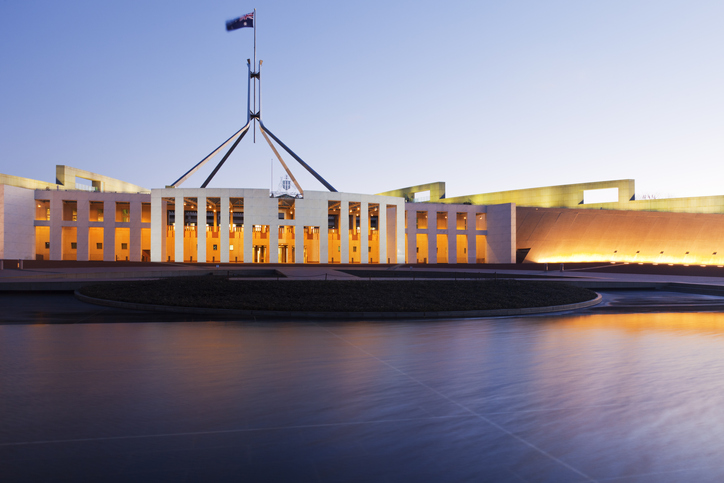The Coalition’s return to power in the NSW state election over the weekend will give retailers stability in coming years, and might even provide a welcome sales boost, while the federal election could see big changes ahead, an employment expert says.
The move could potentially see a boost to retailers’ bottom line as NSW Premier Gladys Berejiklian completes key infrastructure projects, Senior Employment Relations Adviser at Employsure, Nicholas Hackenberg told Retailbiz.
But the re-election could also see retailers freed from red tape, he says, with Labor’s proposed compliance burdens in the shape of stronger industrial court powers for bullying and WHS matters now unlikely.
Overall, Berejiklian’s election is likely to provide opportunities to businesses across all sectors, he says, alongside the NSW Liberal Party commitments to infrastructure.
“Retailers are likely to experience a positive flow on from this,” he said.
“A return of Government would usually stabilise business confidence.”
Whilst this outcome offers a degree of stability, retailers should be mindful of the outcome of the federal election expected in late May or June, Hackenberg says.


In recent media interviews, for example, Labor leader Mr Bill Shorten said he was aligned to the ACTU’s campaign for a “living wage”, which would push the minimum wage to 60 per cent of the national median wage – a move that would directly affect retailers, Hackenberg says.
Mr Shorten is also arguing that Australia’s industrial relations system requires a radical reboot alongside amendments to the Fair Work Act to require the independent industrial umpire to investigate and consider a ‘living wage’ when setting the National Minimum Wage.
These potential policy changes would dramatically affect retailers, Hackenberg says.
“Mr Shorten has been vociferous in his criticism of the Fair Work Commission’s decision to impose a gradual reduction in the penalty rates payable on Sundays and public holidays to employees in the retail, hospitality, and fast food industries. Labor commits to amending the Fair Work Act 2009 to restore the previous penalty rates in the retail and hospitality industry and prohibit any future variations to Modern Awards that will result in a reduction in the take-home pay of employees,” he said.
Prime Minister Scott Morrison’s campaign against Mr Shorten for what he says amounts to forcing businesses to ‘sack’ people to give others a pay rise suggests Liberal will stand firmly against these pay rises, Hackenberg says.
“As it stands, the current National Minimum Wage of $18.93 an hour, is one of the highest minimum wage rates in the world. Notably, in the past two years, the FWC granted wage rises in excess of inflation, 3.3 per cent in 2017 and 3.5 per cent last year.”
Retailers are all-round extremely concerned about potentially huge increases to their wages bill, according to Hackenberg.
“A significant number of retailers in our network are warning against unsustainable pay increases that will cost jobs,” he says.
Despite the possible boost in business confidence from the election, Hackenberg says many retailers are nevertheless still struggling to stay afloat as consumers tighten their purse and lenders withdraw credit.
“Many of our retail clients have told us they are feeling the pinch of poor consumer confidence, higher household debt and falling property prices. Disposable incomes have decreased significantly,” he said.
The news comes as a recent commercial risk outlook report by SV found that more than 900 retailers are at high to severe risk of collapse in the next 12 months.
According to the report, 916 or 2.6 per cent of Australian retailers are facing financial ruin based on information from credit bureaus and providers. Positively, the number of retailers at risk of collapse has fallen since March 2018 (1,460) and March 2017 (1,413).
According to the Australian Securities and Investments Commission (ASIC) records, 3,330 retailers have gone into administration over the past five years, with a number of high profile retailers having already gone into administration in the past six months, including beauty brand Napoleon Perdis, clothing Ed Harry and Roger David, online footwear retailer, Shoes of Prey, and Beds R Us.
The precarious market conditions require retailers to reevaluate their businesses’ offering, Hackenberg says.
“We encourage retailers to understand the profitability of their business, cashflows, look at market trends, and better understand which lines were profitable and which parts of the business were losing money.”
“Importantly, retailers need to be focused on competitive advantage, strengthening connections with customers and streamlining operations so that, when broader market growth does return, they are in the best position.”

